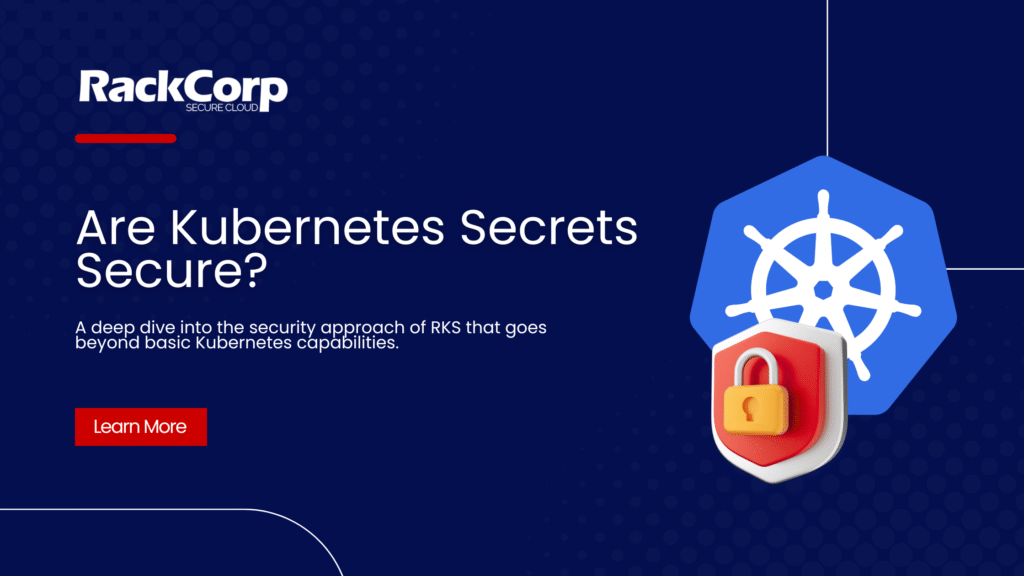Kubernetes Security: The RKS Differentiator

Security concerns represent one of the most significant barriers to Kubernetes adoption—and one of your greatest value propositions as a RackCorp partner. According to the Cloud Native Computing Foundation’s 2024 survey, 37% of organisations identified security as their top Kubernetes challenge, creating an opening for partners who can offer secure, managed solutions.
Are Kubernetes Secrets Encrypted? Addressing Client Security Concerns
When your prospects research Kubernetes, they’ll discover that by default, Kubernetes secrets are merely base64-encoded but not encrypted at rest in the etcd database. This often leads to the question: “are Kubernetes secrets secure?”
This security limitation creates an excellent opportunity to position RackCorp Kubernetes Services (RKS) as a superior solution that addresses these fundamental security concerns.
How RKS Security Features Create Partner Differentiation
RKS implements a comprehensive security approach that goes beyond basic Kubernetes capabilities, providing partners with powerful differentiation points:
1) Enhanced Secret Management
When clients ask about security, highlight how RKS implements additional encryption layers for Kubernetes secrets:
- Encryption of etcd content using industry-standard algorithms
- Key rotation policies to maintain cryptographic security
- Integration with external key management systems for enhanced protection
These features address the common concern “are Kubernetes secrets encrypted?” with a definitive yes when using RKS.
2) Where Kubernetes Stores Secrets and How RKS Protects Them
Understanding where Kubernetes stores secrets allows you to articulate RKS’s security advantages during sales conversations. Default Kubernetes stores secrets in etcd alongside other cluster data, but RKS enhances this with:
- Network-level encryption for all etcd communications
- Access controls limiting who can retrieve secret data
- Audit logging of all secret access attempts
This comprehensive approach gives partners a compelling security story for prospects in regulated industries.
3) Comprehensive Security Beyond Secrets: Multi-Cluster Architecture
RKS’s multi-cluster architecture provides partners with a unique selling proposition by separating:
- Workloads Cluster – Where customer applications run
- Services Cluster – For logging, metrics, and app delivery
- Management Cluster – Handling identity and admin functions
This separation creates security boundaries that traditional Kubernetes deployments lack, giving you a powerful differentiator against less secure alternatives.
Understanding Container Security: Addressing Client Questions
When clients ask “are Kubernetes containers inherently secure?” you can confidently explain that containers provide isolation, but require additional security measures that RKS delivers as standard:
- Pod security policies enforcing security best practices
- Container image scanning for vulnerabilities
- Runtime security monitoring
- Regular security patches for container runtimes
Data Sovereignty Advantages
Understanding where Kubernetes stores images allows you to position RKS’s sovereign cloud advantage. While Kubernetes itself pulls images from registries, RKS ensures this process happens within the country’s borders for local businesses through:
- Private image registries with access controls
- Image scanning for vulnerabilities before deployment
- Enforced signed image policies
- Data residency compliance with local regulations
For clients in regulated industries, this sovereignty presents a compelling advantage over multinational providers.
Why Kubernetes Is Used in DevOps and How Partners Can Leverage This Trend
Kubernetes in DevOps extends beyond technical benefits—it establishes consistent, declarative approaches to application deployment that enhance security and reliability. Position RKS as enhancing these DevOps practices through:
- Security guardrails preventing unsafe deployments
- Automated compliance checking
- Consistent security policies across environments
- Reduced attack surface through infrastructure standardisation
These benefits address both security and operational concerns, broadening your potential customer base.
Kubernetes Resources and Compliance Tracking
The ability to track Kubernetes resources provides crucial audit capabilities for security incidents and compliance. Highlight how RKS enhances attribution through:
- Detailed audit logging of all resource creation
- Integration with identity management systems
- Non-repudiation mechanisms ensuring accountability
- Historical tracking of resource modifications
These capabilities are particularly valuable for partners targeting financial services, healthcare, and government clients with strict compliance requirements.
Join Our Upcoming Partner Webinar: Fully Managed Kubernetes, Fully Realised Potential with RKS
Ready to leverage RKS’s security advantages to win new business? Join our exclusive partner webinar on June 11th, where we’ll explore:
- How to position RKS security features against competing solutions
- Identifying security-conscious prospects most likely to convert
- Compliance frameworks supported by RKS’s sovereign architecture
- Partner resources for security-focused sales conversations
Register for our exclusive partner webinar now and discover how RackCorp Kubernetes Services can help you win security-conscious clients while delivering genuine value.
This is part 2 of our 3-part series on RackCorp Kubernetes Services for partners. In our final installment, we’ll explore how to position RKS for maximum partner profitability and long-term client success.
No Comments
No comments yet.
RSS feed for comments on this post. TrackBack URI
Leave a comment
You must be logged in to post a comment.